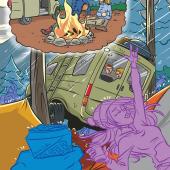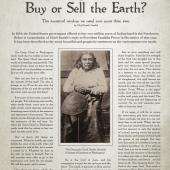How I Threw it All Away
I started buying bottled water a few years ago, when I decided to start living by the 64-ounces-a-day rule. At first, the bottles were great. I could put a few in the car, two in my gym bag, and one in the diaper bag. I always had a bottle nearby, and I was finally drinking enough water.
Then the empty bottles started looking at me like I was a hooker in a monastery. They were everywhere, and BFI was hauling away bags of bottles from our overflowing trash can every week. So I started to recycle the bottles. The first pile was shocking—I’d never thrown away so much plastic in my life. But recycling soon became a game: What else could I take to the bins? The BFI container was getting emptier, and putting anything in there came with a feeling of defeat.
Today it seems I am not the only one who sees her overflowing trash can as a guilty sign of bad habits. About 30% of all trash in America is recycled, up from 17% in 1990, according to America Recycles Day, a national organization that promotes recycling through its annual awareness event (November 15), and over 90% of Montanans have access to some type of recycling opportunity. Although Pacific Steel, Pack Tech, and the City of Bozeman accept some things, Headwaters Recycling Cooperative is the organization most Bozemanites encounter. Established in September 1997, Headwaters is a nonprofit organization supported by several counties in Montana, Wyoming, and Idaho. Covering 35,000 square miles, Headwaters is the nation’s largest recycling program by area.
Dirty Deeds
After putting stuff in the Headwaters bins around town, I often wonder how my castaways will be reincarnated. Will my bottles become more bottles? Will my newspapers become my oatmeal box? And what is anyone really going to do with a bunch of outdated magazines?
After some investigation I found out that each material is treated differently, but in general the recycling process has three steps: collection, processing, and manufacturing. For Bozeman, this largely means that people take their recyclables to a Headwaters location and then Headwaters sells the materials to A&S Metals in Butte, which then sells the stuff to processors and manufacturers, according to Bill Crane at Headwaters.
But it’s not that simple, according to the Montana Department of Environmental Quality (MDEQ), because I am also part of the problem. People who put the wrong stuff in the wrong bins cause serious problems for Headwaters—brokers and manufacturers can’t and won’t tolerate contaminated feedstock. “What may seem like an innocent mistake or a small indiscretion can actually cause whole bales or loads of recyclables to be rejected,” says Sandra Boggs, MDEQ’s recycling and marketing development specialist. She adds, “Then guess where the load goes? The landfill!” This is not only a terrible waste, it costs money: A&S docks Headwaters when too much of the wrong stuff is in the bin.
I really have to take all the peanut butter out of the jar too, said Sandra. Putting dirty stuff in the bins attracts insects and mice or rats, who leave behind their own “contamination” and damage the bins. Bees also make it “downright painful” for the handlers processing glass and cans. Leaving labels on is okay; the sorting equipment separates them from the valued material.
The Road to Smellville
But contamination issues aren’t the program’s biggest problems. Montana is spread out and thinly populated, meaning that recycling companies spend a lot on gas and labor to collect materials. Ironically, the higher gas prices go and the smaller a town stays, the less feasible it is to recycle. “Transportation costs often make the trip to a market cost-prohibitive when compared to the commodity value,” says Boggs. And because material is sold by weight, small towns don’t always generate the tonnage that brings good prices. Plastic is the hardest nut to crack in this regard because it is light but bulky.
Mills, which turn collected materials into pellets and other bits for manufacturers, are almost nonexistent in Montana. Missoula’s Stone Container is the exception; they buy most locally recycled cardboard, which, along with office paper and newspaper, often gets good prices. Glass also stays home: The MDEQ recently purchased a glass pulverizer that turns recycled glass into sand and gravel substitutes. But most mills are located near their customers—the manufacturers who use recycled material. For A&S Metals, this means driving virtually all of Headwaters’ already road-weary materials to Spokane or other faraway markets, adding more transportation costs and further reducing the program’s financial feasibility.
Although the outlook for Montana’s recycling program may be uncertain, residents seem happy to give it a chance: Headwaters’ collected tonnage almost doubled from 2000 to 2004, and Bozeman recycled about 15% of its trash in 2004. The warm fuzzy feeling and the worries surrounding the remaining life of the landfill are still good reasons to recycle, and Bozeman’s “pay as you throw” system provides some financial incentive because customers pay more for trash bins that hold more garbage.
But to make the program really successful, Headwaters and the MDEQ seem to agree that more tonnage and local mills are the keys to securing the program. This means more people need to recycle on a regular basis, which requires changes in behavior and discipline—two things Americans aren’t very good at. Further, local manufacturers’ use of recycled products could lower transportation costs and improve the financial feasibility of the program. But, like my 64-ounce commitment, the practical benefits have to outweigh the costs.
Headwaters Recycling Local Drop-Off Locations
-The fairgrounds
-West Babcock Park, 3450 West Babcock
-Home Depot on North 19th
-Kmart on North 7th Avenue
-Wal-Mart on North 7th Avenue
-MSU: On 7th near Campus Police
-MSU: In front of Langford Hall
-MSU: 13th and College next to new parking lot
-Gibson’s Discount Center on West Main, near Jiffy Lube
-Softball field parking lot on Highland Boulevard
Other Recycling Services in Town
Pack Tech accepts used packing peanuts and styrofoam packing material (but may throw some out if they run out of room).
University Square Shopping Center, 587-0558
The City of Bozeman landfill (587-7890) will recycle certain items for you. Compost materials and yard waste can be deposited into the city composting facility. Clean glass is also accepted: the city uses it in road and parking lot projects. Wire (both metal and cables) are sold for recycling, as are appliances. The Street Department also runs a motor-oil recycling program (582-3200).
Pacific Steel accepts scrap metal, newspaper, office paper, cardboard, and cans.
315 W. Griffin Drive, 587-0662
Triple R Recycling will also come right to your house and get your recyclables. Contact their pickup service at 406-585-8188.












